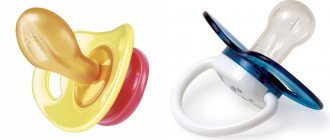How long should a child sleep?
Almost the entire time that the baby was in his mother’s belly, he slept. With birth, the child’s sleep structure begins to gradually change, but this does not happen immediately.
- In the first 2 months, the newborn does not distinguish between day and night, waking up from hunger at approximately equal intervals during the day. After eating, the baby stays awake for only a short time and then falls asleep again. In total, at this age the baby sleeps from 16 to 18 hours a day.
- The daily routine “grows up” starting at 3 months. The duration of uninterrupted sleep at night gradually increases, and during the day the child does not close his eyes longer after waking up. By six months, total sleep time decreases to 15–16 hours a day.
- The process of normalizing the sleep schedule continues and by the time the baby is one year old, he sleeps 9–11 hours at night, without causing any trouble to his parents. During the day he falls asleep only a couple of times, and the rest of the time he stays awake and explores the world. At the age of one year, the total duration of daytime and night sleep is approximately 13–14 hours.
It is important to understand: the figures we have given are averages. Don't assume your baby is sleeping poorly if their sleep schedule is different. Each child has its own individual characteristics, and the key criterion for good sleep is the baby’s well-being. If the newborn is healthy and alert, everything is fine. If your baby often wakes up, groans and tosses and turns in the crib, is capricious and cries, this is a reason to talk to a specialist and discuss the problem.
Baby's nap time
Pediatricians note that in the first month after birth, babies sleep a lot, but poorly - they often wake up, worry, and cry. On average, sleep takes 15-20 hours a day. Half of this time occurs at night.
A newborn does not sleep well because he does not have a routine - he lives “at his own rhythm” for the first months. It’s okay if a child wakes up to 3 times a day from hunger. He still has a small stomach - it’s impossible to eat so much at once that you don’t want to eat for more than 3-5 hours.
Such restless “chaotic” sleep is a biological feature of babies under 3 months. Parents should not be scared by the fact that a child sleeps completely differently than an adult. Babies rest in light sleep. They can wake up every 15 minutes and sleep for 1 hour. “Active” naps make up up to 50% of the total rest time - this is completely normal for a newborn.
How to put your baby to sleep correctly?
Teach your baby to a certain daily routine. Each child’s evening should end the same way, according to a clear ritual. For example, if the baby gets used to being bathed at the same time, then given a massage, then read a fairy tale and immediately put to bed, this sequence of actions in itself will set him up for a sound sleep.
If a newborn does not sleep well, mothers often resort to rocking. Rhythmic movements and the quiet voice of the person closest to you in the world are great for falling asleep, but in the future this can become a problem. The day is not far off when you will have to stay late at work, go on a business trip, or go to visit relatives in another city. Even if you are one hundred percent sure that nothing like this will happen, in just a few months it will become physically difficult for you to carry a grown child in your arms for a long time.
Try not to form habits in your baby that will affect the quality of his sleep. If a child, falling asleep, sucks on his mother's breast or pacifier, then waking up for a moment during the REM sleep phase, he will not be able to fall asleep without it.
What should you do to wean your baby from this habit - just put him in bed without nightly rocking? Not an option: a baby, deprived of an important part of the bedtime ritual, will be capricious and refuse to close his eyes. Usually in such a situation the baby cries for a long time and then sleeps poorly, tosses and turns in his sleep, and often wakes up.
There is only one way out - the ritual of motion sickness must be replaced by another, and a special soft toy can best cope with this. Buy your baby a bunny, bear or other soft friend and do not use it for play during the day. The child must understand that this talisman always comes only at night, and gradually learns to quickly fall asleep by placing a hand on his fluffy side.
Most likely, on the first day of falling asleep according to the new rules, everything will not go as smoothly as we would like. You put a sleep toy in the crib, talk to the baby, pat him on the head, leave the room - and almost instantly hear the baby crying. Don't come back right away, wait one minute and only then come back. When the baby calms down, leave the room again. If the crying repeats a second and third time, wait longer - three minutes; for the fourth and subsequent returns, increase the wait to five minutes.
On the second day, instead of 1, 3 and 5 minutes, the return intervals should be increased to 3, 5 and 7 minutes, on the third and further - to 5, 7 and 9 minutes. In a few days, the child will forget about motion sickness and learn to fall asleep with his new night friend. By the way, don’t forget to come up with a nice name for him.
If the reason for crying is hunger
In the case when a newborn constantly cries, sleeps little and poorly, then one of the most likely reasons for this behavior is hunger. The baby begins to look for the breast and smack his mouth when his mother takes him in her arms.
If a child has eaten less than usual and slept no more than two hours, he may cry as a result of hunger. When your baby cries a lot, the first thing you should do is try to feed him, and only then make other attempts to calm him down.
When the baby cries often, sleeps little, and parents assume that the reason for this is hunger, then the mother believes that breast milk is not enough for the child. And in the event that the child is bottle-fed, he does not get enough of a portion of the formula. However, this is not always the case.
If your baby doesn't sleep well and cries constantly, is it colic?
Quite possibly. Colic is one of the common reasons why a newborn does not sleep well - up to 40% of babies worldwide suffer from it. Infant colic begins at a very early age - at 2-3 weeks of a baby’s life. At about 6 weeks they reach a maximum level, then begin to slowly decline and usually stop completely at 4-5 months.
It is almost impossible to miss or not understand that a child has colic. Symptoms of this condition in a healthy baby include bouts of crying lasting more than three hours, repeated more than three days a week. At the same time, the baby’s tummy becomes tense, he draws in his legs and starts screaming, from which his heart bleeds. Colic usually begins in the evening and, of course, you can’t count on a newborn’s quiet sleep on such evenings.
What should parents do in such a situation? There is no clear answer to this question. The fact is that medicine does not yet fully understand why colic occurs, and therefore cannot offer one hundred percent working methods to combat it. If your baby is constantly crying, pediatricians recommend trying to calm him down in the following ways:
Motion sickness
Take the baby in your arms, walk and rock him. This helps some babies - after a while they relax and fall asleep.
Massage
If your baby has a colic attack and is crying, gently massage his tummy and back.
Quiet, rhythmic sounds
Relaxing music, the gentle sound of the surf, the calm beating of a mother’s heart - in some cases, sound therapy can be the answer to the question of how to put your baby to sleep.
Mom's warmth and care
The following exercise can help calm your child. Dim the lights in the room, then lie on your back, hold your baby to your chest and talk quietly to him, rocking slightly from side to side.
Vibration
You may have come across cradles, chaise lounges and swings with a vibration mode on sale. If your baby is having trouble sleeping, these devices can help. Also, some parents note that the child quickly falls asleep in the car - all because of the same vibration.
Proper diet
With mother's milk, some undesirable substances can enter the baby's body, aggravating the course of colic. It is advisable for a nursing woman to avoid coffee, chocolate, onions, garlic and other spicy foods.
Which of these methods will help in your case? It is unknown, so doctors recommend trying them all one by one and choosing the one that suits your baby.
Having learned that your child is crying due to colic, some friends may recommend folk remedies - various herbal teas and dill water. The effectiveness of these methods has not been proven, and before using them you should definitely consult a specialist.
Factors influencing lack of sleep
The main factor in a baby's poor daytime sleep is overstimulation. It can be caused by being in a noisy, bright, crowded place for a long time, or by sleeping too long at night.
From fatigue, the child seems to “switch off” and suddenly falls asleep. This is a protective reaction of the nervous system, a way to distance yourself as much as possible from the restless outside world. The condition is not similar in structure to sleep, which is why the baby wakes up not at all rested. Cries from incomprehensible fatigue, is capricious, cannot sleep at night.
Therefore, it is important for parents to provide their child with hours of complete rest during the day, so that the baby can sleep in a quiet environment and wake up rested. Such “outages” will stop by 6-8 weeks. You can tell how tired your baby is by his behavior:
- Yawns.
- Rubs eyes and ears.
- Stops being active, bends his legs, slows down in his movements.
- Not interested in others, looks at one point or “nowhere.”
- He suddenly becomes restless and whines a lot.
With such signs, you need to put your baby to bed as soon as possible. Otherwise, the child starts screaming and crying - it is already difficult to calm him down.
The second important factor is external discomfort. Parents need to check:
- the condition of the child’s diapers, crib, and clothes;
- temperature, lighting, noise level in the room.
Other factors are hunger and internal discomfort. The child is offered food and his condition is monitored. He may have difficulty sleeping due to colic and severe pain.
What should you do if your newborn sleeps poorly at night but does well during the day?
For some mothers, the child continues to seem small, even after he has already had his own children and built a successful career. For the same reason, they consider the baby to be a newborn up to a year or more. If you are now talking about a toddler who is crawling or even starting to walk and who has confused day with night, most likely the problem is related to insufficient physical activity or overstimulation.
Officially, a child is considered a newborn only 1 month of life, more precisely - 28 days from birth.
If your older baby is having trouble sleeping, try these methods. They can usually correct your sleep-wake schedule in just a few days.
Help your baby get tired
Play, walk, motivate your child to constantly move. Before you feed and quickly put your baby to bed, take him for a walk in the fresh air for half an hour.
Adjust your diet
Do not feed your baby rich food during the day, which makes him sleepy.
Limit your nap time
If your baby falls asleep during the day, let him take a nap for half an hour, and then wake him up. There is no need to experience mental suffering - now this is only for the benefit of the baby.
Eliminate causes of overexcitement
If the baby is not sleeping, perhaps something at home is helping to increase his tone. This could be a TV that is constantly on, adults communicating in a raised voice, long emotional conversations on the phone, loud music, etc. Because of these irritants, the child becomes too excited and then cannot fall asleep, tosses and turns in the crib and often wakes up.
In a truly newborn child, i.e. baby in the first month of life, there should be no differences in the structure of sleep during the day and night. If a newborn only sleeps poorly at night, the cause may be colic, which usually begins in the evening and prevents the baby from falling asleep. No colic? Then try to understand what goes differently at night than during the day. Maybe you turn on the heater and your baby gets hot? Maybe you're swaddling too tightly? Maybe the baby is afraid of the dark and needs to turn on the night light? Find out what's wrong and you can restore your baby's restful sleep by eliminating the causes of the problem.
If your newborn has trouble sleeping for several days and you cannot figure out why this is happening, contact a specialist.
To keep your baby sleeping soundly: advice for dads and moms
Pediatricians share universal methods for new parents:
- Provide your child with a quality night's sleep. Half an hour before lights out, start hanging the curtains, turn off the music and TV.
- Take care of your vacation. The baby will react to the condition of the mother suffering from lack of sleep. The best advice is to live in your child’s schedule, sleep and stay awake with him.
- Don’t forget to not only feed, but also change diapers on time. A common cause of restless sleep is irritation of delicate skin with the contents of the diaper. The baby will twitch, twist, strain, arch, trying to get rid of the discomfort.
- Do not place your baby on a pillow. Until the age of 1 year, the baby can do without it.
- Use only breathable bedding to prevent your baby from sweating or getting his feet entangled.
- Avoid overheating your baby. Make sure the temperature in the nursery is comfortable.
- Make sure your baby sleeps either on his back or on his side. Tummy naps are dangerous. The baby may begin to groan and suffocate, burying his nose in the blanket.
- Install a humidifier in the nursery, be sure to turn it on during the heating season.
The cause of poor daytime and night sleep in children is not always harmless. It can be allergies, rickets, iron deficiency anemia, problems with the gastrointestinal tract, respiratory system and more. Therefore, if the baby has persistent sleep disturbances, you will need to contact a pediatrician.
Are there other reasons for poor sleep?
Most of the reasons why a baby has difficulty falling asleep and often wakes up are associated with physical or psychological discomfort:
- Malaise
In addition to colic, a child may also experience other unpleasant sensations, such as ear pain, skin irritation from diaper rash, or allergic itching. Usually it is not difficult to localize such problems: if the baby’s hands are free, he pulls them towards the sore spot.
- Reflexive shaking of the hands
The baby does not yet have full control of his body. Sometimes at night his arms begin to move reflexively, and he wakes up. Loose swaddling (in no case tight) will help to slightly limit movements during sleep. In general, this is a temporary phenomenon - it will disappear on its own by 6-8 months.
- Overfilled diaper or wet diaper
The child must be changed in a timely manner, otherwise he will be rightly indignant. Huggies Elite Soft diapers have a special moisture indicator, with which you will immediately understand whether it is time to change clothes or the problem is something else. In any case, change diapers at least every 3-4 hours.
- Is your baby hot or cold?
Many mothers are always afraid that their baby will freeze, and they wrap him up very tightly. However, overheating causes even more discomfort for the child. If the baby's face turns red and sweat appears under her clothes, it means that you have overdone the insulation.
- Stress
Did guests come to you, and everyone took the baby in their arms? Have you traveled somewhere with your baby? Are your neighbors doing renovations and making a lot of noise? It is not surprising that the baby tosses and turns and often wakes up. This will pass, but you may need to get up and comfort your baby more often tonight.
If your newborn begins to sleep poorly, look for the cause and eliminate it. If this does not work, consult your pediatrician. In the vast majority of cases, sleep problems are easily resolved or disappear as you grow older, and you will soon forget about them forever. In the meantime, we wish good night and sweet dreams to you and your child!
Why does a one-month-old baby sleep poorly during the day?
Let's consider the main reasons, which are divided into two large groups: external, that is, not related to diseases, and internal.
External reasons:
- discomfort. It is most often caused by hunger or a wet diaper;
- noise. Although it is believed that it should not disturb children, if neighbors are doing repairs or someone is screaming under the window, this can hardly accompany normal falling asleep;
- physical and emotional overstimulation. He can be suspected by his overly active behavior, crying and persistent reluctance to sleep;
- bad microclimate. Optimal temperature and humidity conditions: 19-21 degrees, 50-70%. It is extremely important to ventilate more often so that the room where the baby rests is filled with fresh air. ;
- too light in the room;
- lack of daily routine.
Internal reasons:
- imperfection of the nervous system. This phenomenon is temporary, due to the fact that the baby, who has survived childbirth, which is a huge stress, simply wants to feel safe all the time, that is, to be in his mother’s arms. But since she cannot hold the baby all the time, he wakes up at the slightest attempt to put him to sleep;
- consequences of difficult childbirth or trauma received during birth;
- neurological diseases;
- imperfection of the digestive system. A mother who is breastfeeding may not eat properly, sometimes the child is simply overfed or the pediatrician’s recommendation to supplement the baby with water is ignored, and constant pain in the tummy and accumulated gases are unlikely to contribute to normal sleep.
Symptoms for which you should visit a specialist (pediatrician, neurologist):
- the total number of hours of sleep per day is less than 15;
- every 5-10 minutes the baby wakes up, even if he had been awake for a long time;
- there are constant signs of anxiety for no reason;
- up to 4-5 hours the baby is active without sleep breaks;
- the process of going to bed is accompanied by whims - getting the baby to sleep is extremely difficult.
What to do if your baby has confused day with night
One month old baby doesn't sleep all day
If an infant begins to stay awake at night and sleep during the day, it is necessary, first of all, to determine the cause of such a failure in the regime.
The baby mixed up day and night
If these are symptoms of painful conditions (colic, pain, runny nose), consultation with a pediatrician and prescribed adequate treatment will help.
When health problems are excluded, the most effective, but time-consuming advice is to not let the child fall asleep during the day. If the problem concerns children of the first year of life, it is enough to temporarily remove one of the daytime naps so that he does not sleep for at least 4 hours before the start of night sleep.
In general, from birth it is recommended to teach the baby to distinguish between day and night, developing in him the concept that day is when it is light and noisy, and night is dark and quiet.
At 1 month
Newborn babies benefit greatly from “white noise” (similar to intrauterine sounds, which the baby still associates with peace and pleasure), on its own or superimposed on quiet, calm classical music.
Complete darkness is necessary for proper sleep, so it is undesirable to use even the dimmest nightlights. They can be turned on when the mother gets up to feed the baby. It is also advisable to have thick curtains or blinds on the windows so that the child is not disturbed by bright street light.
At 3 months
Often a 3-month-old baby begins to suffer from colic, so at this age, for a comfortable night's sleep, it is very important to follow the diet: do not overfeed at night and provide enough moisture.
Overheating is also unacceptable, so the air in the room where the baby sleeps must be cooled. Walking in a stroller is very good for falling asleep at night - many babies rock well.
Kids fall asleep well after an evening walk in the fresh air.
If a 3-month-old baby sleeps all day, it is necessary to organize comfortable conditions for him to have a good night's sleep and fall asleep easily: the baby should not be overfed, not wrapped up, the bed and pajamas should be very soft and not restrict his body.
You can use aromatherapy (in the form of a few drops of mint oil in an aroma lamp or when bathing a child), and also place a sachet pillow with “sleepy” herbs near the crib.
At 4 months
At this age, a small child is more and more awake during the daytime, therefore, when confusion between day and night occurs, he should be loaded as much as possible during daylight hours, while it is advisable to minimize daytime sleep (only in case of visible severe fatigue). To keep your toddler active, you can use:
- funny and playful children's songs;
- do a light massage and turn over on your tummy;
- new toys;
- constant conversations, nursery rhymes, jokes.
For older children, you can increase physical activity: this includes gymnastics (according to age), outdoor games, swimming and walks.
Note! After consultation with a pediatrician, it is possible to use soothing teas and decoctions for better sleep in the evenings.
Table of sleep norms for children under one year old
2 month old baby does not sleep day or night
American scientists, having brought together the opinions of neurologists, pediatricians and psychologists, have compiled approximate recommendations for the duration of sleep and wakefulness for young children.
Sleep standards for babies up to one year old
Age, months Duration of sleep per day, hours.NightDayNumber of daytime dreams
| 1 | 15-18 | 8-10 | 6-9 | 3-4 |
| 2 | 15-17 | 8-10 | 6-7 | 3-4 |
| 3 | 14-16 | 9-11 | 5 | 3 |
| From 4 to 5 | 15 | 10 | 4-5 | 3 |
| From 6 to 8 | 14,5 | 11 | 3,5 | 2-3 |
| From 9 to 12 | 13,5-14 | 11 | 2-3,5 | 2 |
We recommend reading: Sleep and teething - what to do?
These figures are averages – each child is different.
What are the dangers of frequent crying and sleep disorders?
Many parents and the older generation do not see anything wrong with their children’s crying, letting them “scream it out” and making no attempt to calm them down. This is not a physiological method of dealing with crying, whatever the reason, especially if the child also sleeps poorly.
Crying loads and overstimulates the nervous system, threatening the development of “rolling” with periods of respiratory arrest and acute brain hypoxia. This will have an extremely negative impact on the development of the child, leading to nervousness and anxiety, difficulties in learning and disinhibition of arousal processes.
note
When screaming, the lungs are ventilated worse, not better, as many people think, and this leads to tissue hypoxia and preconditions for pneumonia, bronchitis with obstruction, as well as various anomalies in the structure of the lungs (atelectasis, bronchiectasis).
Alena Paretskaya, pediatrician, medical columnist
15, total, today
( 172 votes, average: 4.62 out of 5)
Birth trauma of a child: symptoms, consequences, treatment
Porridge for baby's first feeding: types, recommendations











